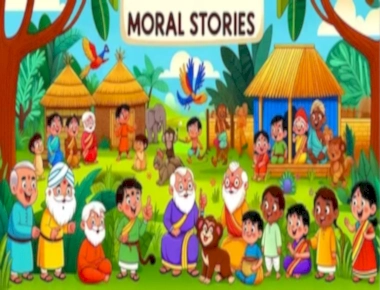Moral stories in English
Engaging your children with stories in English with moral lessons can be a delightful and educational experience. Recalling your childhood, it’s likely that stories in English with moral themes were a significant part. Unfortunately, these types of stories in English with moral values are not as common in contemporary literature. Sharing stories in English with moral messages with your child can be a unique and enriching activity. For this purpose, we have compiled a thoughtful list of 12 such stories in English with moral lessons. This collection focuses on stories in English with moral teachings, explaining how each story can help inculcate moral values in children. These stories in English with moral implications are an excellent way to introduce important life lessons in an engaging and memorable manner.
To enhance storytime with these short stories in English with moral messages, try using different voices for characters, engaging in discussions about the story’s moral, and allowing children to participate in storytelling. Utilizing props and varying reading locations, even outdoors, can further enrich the experience. This collection of small stories in English with moral lessons is just the beginning. As your storytelling journey progresses, explore more such stories in English with moral themes to broaden your child’s moral and ethical understanding.
[ez-toc]
The Ant and the Grasshopper

In a sunny field, a hardworking ant diligently gathered food all summer, while a grasshopper merrily sang and played, mocking the ant’s tireless efforts. As winter approached, the ant’s storehouse was full, but the grasshopper found himself without food. Desperately, the grasshopper approached the ant, seeking help. The ant, recalling the grasshopper’s earlier laughter, advised him about the importance of preparation and hard work, teaching the grasshopper a valuable lesson about planning for the future.
Moral of the Ant and the Grasshopper short story: Preparation and diligence are key to ensuring future well-being.
The Thirsty Crow’s
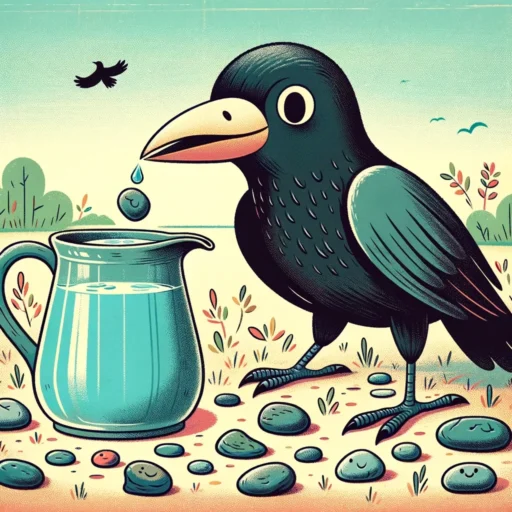
On a hot summer day, a thirsty crow flew over the fields in search of water. For a long time, he flew over the fields, but there was no water to be found. Finally, he arrived in a garden where he saw a pitcher. When he looked into the pitcher, he found that there was very little water in it. The crow tried to push his head into the pitcher, but he found that the neck of the pitcher was too narrow.
Then he tried to overturn the pitcher to let the water out, but it was too heavy. The crow thought hard for a while. Then looking around it, he saw some pebbles. He suddenly had a good idea. He started picking up the pebbles one by one, dropping each into the pitcher. As more and more pebbles filled the pitcher, the water level kept rising. Soon it was high enough for the crow to drink. His plan had worked!
Moral of the Thirsty Crow’s short story: Innovation and problem-solving can help navigate challenging circumstances.
The Boy Who Cried Wolf
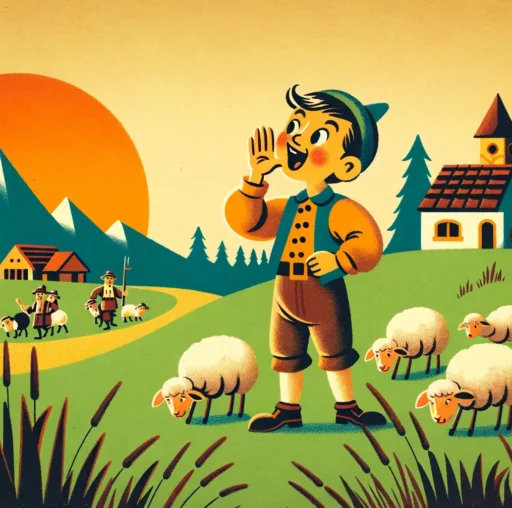
Moral of the Boy Who Cried Wolf short story: Honesty is important; constant deceit can lead to loss of trust and serious consequences.
The Hare and the Tortoise

In the forest, there lived a swift hare who bragged about how fast he could run. Tired of hearing him boast, the tortoise, with his slow and steady pace, challenged him to a race. All the animals in the forest gathered to watch.
The hare ran down the road for a while and then paused to rest. He looked back at the tortoise and cried out, “How do you expect to win this race when you are walking along at your slow, slow pace?” The tortoise walked slowly but steadily, and, after a time, passed the place where the hare was sleeping. But the hare slept on very peacefully; and when at last he did wake up, the tortoise was near the goal.
The hare now ran his swiftest, but he could not overtake the tortoise in time. The tortoise, who had not stopped once, plodded on and plodded on, and when the hare arrived at the finish, he found the tortoise had already won. The moral of the story is that slow and steady wins the race.
Moral of the Hare and the Tortoise short story: Steady persistence often leads to success, while overconfidence and complacency can result in unexpected outcomes.
The Wind and the Sun

Moral of the Wind and the Sun short story: Kindness and gentle persuasion are often more effective than force and aggression.
The Lion and the Mouse
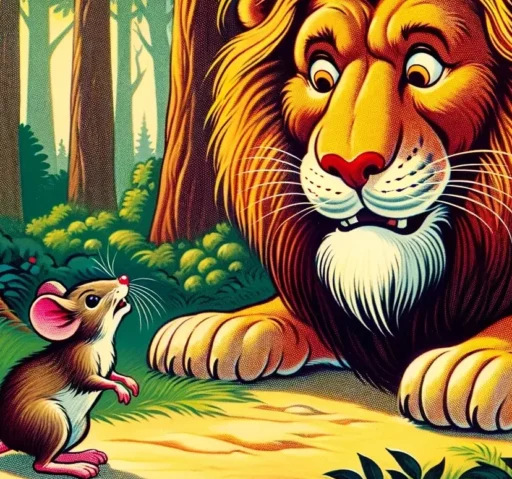
Once upon a time, a lion was asleep in the jungle when a little mouse began running up and down upon him. This soon awakened the lion, who placed his huge paw upon the mouse and opened his big jaws to swallow him.
“Pardon, O King!” cried the little mouse. “Forgive me this time, I shall never forget it. Who knows but what I may be able to do you a turn some of these days?”
The lion was so tickled at the idea of the mouse being able to help him, that he lifted up his paw and let him go.
Sometime later, the lion was caught in a net. Unable to free himself, he filled the forest with his angry roaring. The mouse knew the voice and quickly found the lion struggling in the net. Running to one of the great ropes that bound him, she gnawed it until it parted, and soon the lion was free.
“You laughed when I said I would repay you,” said the mouse. “Now you see that even a mouse can help a lion.”
Moral of the Lion and the Mouse short story: No act of kindness is ever wasted, and help can come from the most unexpected places.
The Honest Woodcutter
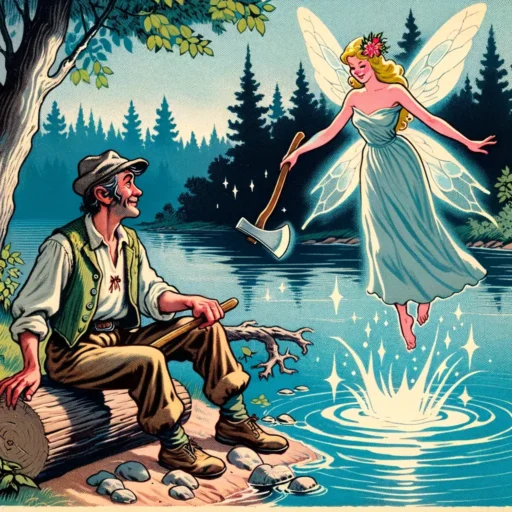
In a village, there lived a poor woodcutter who worked hard every day in the forest. One day, while he was cutting a tree near a river, his axe slipped from his hands and fell into the river. The river was so deep that he couldn’t retrieve it. He sat down on the bank and wept, lamenting his lost tool which was his only means to earn a living.
Suddenly, a beautiful fairy appeared before him. She asked him why he was crying, and the woodcutter explained his misfortune. Hearing his story, the fairy dived into the river and brought up a golden axe.
“Is this your axe?” she asked. The woodcutter replied, “No.”
She dived again and brought up a silver axe. Again, the woodcutter replied, “No, that is not my axe.”
The fairy dived into the river for the third time and brought up the iron axe that the woodcutter had lost. “This is my axe!” the woodcutter exclaimed with joy.
The fairy was pleased with the woodcutter’s honesty and rewarded him with all three axes. The woodcutter returned to his home, grateful for his unexpected fortune and the kindness of the fairy. The moral of the story is that honesty is always rewarded.
Moral of the The Honest Woodcutter short story: Honesty is always rewarded, and truthfulness leads to unexpected blessings.
The Fox and the Grapes

One hot summer’s day a fox was strolling through an orchard until he came to a bunch of grapes just ripening on a vine hanging over a lofty branch. “Just the thing to quench my thirst,” he said.
Drawing back a few paces, he took a run and a jump, and just missed the bunch. Turning around again with a One, Two, Three, he jumped up, but with no greater success. Again and again, he tried after the tempting morsel, but at last had to give it up, and walked away with his nose in the air, saying: “I am sure they are sour.”
It is easy to despise what you cannot get.
Moral of The Fox and the Grapes short story: It’s easy to despise what you cannot have, but acknowledging your limitations can be a sign of wisdom and maturity.
The City Mouse and the Country Mouse
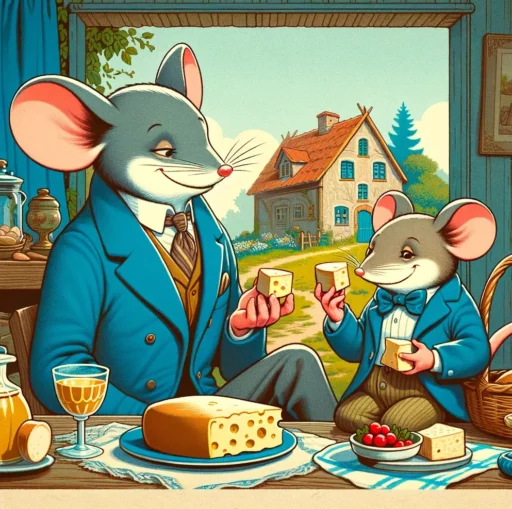
Once there was a country mouse who invited his cousin who lived in the city to visit him. The city mouse was so surprised at the plain food his cousin had that he invited him back to the city for a visit and a taste of the fine life.
So the country mouse went to the city and began his feast. There was bread, barley, cheese, and fine delicacies like honey and dried fruit. Just as they were beginning to enjoy themselves, a cat attacked them. They scurried away as fast as they could to a tiny hole under the cupboard. After that, they had to wait quite a while for the cat to leave. When they ventured out again, another attack sent them scurrying back.
The country mouse decided to return home, saying: “Better beans and bacon in peace than cakes and ale in fear.”
Moral of the The City Mouse and the Country Mouse short story: Simplicity and safety are often more valuable than wealth and luxury fraught with risks and anxieties.
The Pied Piper of Hamelin
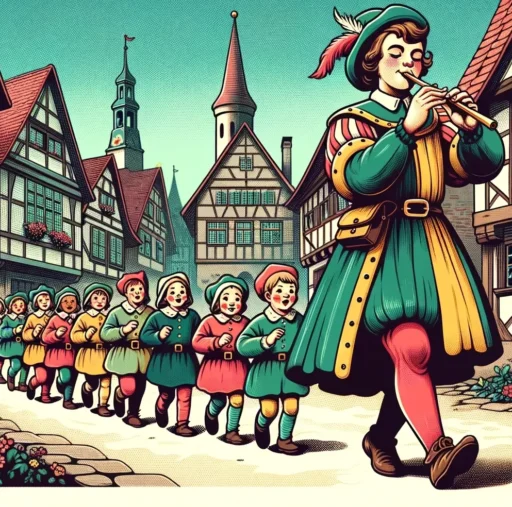
In the town of Hamelin, there was a great problem of rats. The rats were so big and fierce that they fought dogs and cats. They bit the babies in the cradles and ate the cheeses out of the vats and made nests inside men’s Sunday hats.
The townspeople turned to a mysterious piper, dressed in a coat of many colored, bright cloth, for help. The piper promised to rid the town of rats in return for a certain sum of money. The mayor agreed and the piper played his pipe. The rats followed him, and he led them all to the river, where they drowned.
But when the piper returned for his payment, the mayor broke his promise and refused to pay. The piper left the town, vowing to return later to take his revenge. True to his word, he came back and played his pipe again. This time, all the children in the town followed him out, and he led them away, never to be seen again. The people of Hamelin learned a harsh lesson about the importance of keeping promises.
Moral of the The Pied Piper of Hamelin short story: Fulfilling promises and agreements is crucial. Breaking trust can lead to unforeseen and severe consequences.

Reading these short stories in English with moral messages from an early age is beneficial for language development and moral learning. Our collection of small stories in English with moral teachings includes many inspirational tales around the world. Remember to check back for more additions to our collection of stories in English with moral lessons, and feel free to share your favorite small stories in English with moral messages with us at info@kidspep.com for inclusion in our future posts!
